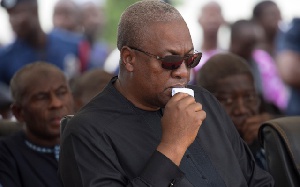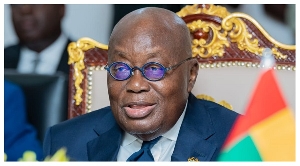General News of Friday, 5 March 2021
Source: www.ghanaweb.com
Highlights: The five reliefs sought by John Mahama and answers by Supreme Court
Unlike the 2013 election petition where it took less than ten minutes for the now-retired Justice Atuguba to read the verdict, the reading of the ruling on the 2020 election petition by Chief Justice Anin Yeboah lasted almost two hours.
The Chief Justice took pain to read the entire ruling to the public, explaining the basis for the decision of the entire panel of seven to dismiss Mahama’s application.
John Mahama had come to them on December 30, 2020, praying them to grant five things.
The reliefs John Mahama was seeking are;
(a) A declaration that Mrs. Jean Adukwei Mensa, Chairperson of 1st Respondent and the Returning Officer for the Presidential Elections held on 7th December 2020, was in breach of Article 63(3) of the 1992 Constitution in the declaration she made on 9th December 2020 in respect of the Presidential????
(b) A declaration that, based on the data contained in the declaration made by Mrs. Jean Adukwei Mensa, Chairperson of 1st Respondent and the Returning Officer for the Presidential Election held on 7th December 2020, no candidate satisfied the requirement of Article 63(3) of the 1992 Constitution to be declared president-elect;
(c) A declaration that the purported declaration made on 9th December 2020 of the results of the Presidential Election by Mrs. Jean Adukwei Mensa, Chairperson of 1st Respondent and the Returning Officer for the Presidential Election held on 7th December 2020 is unconstitutional, null and void and of no effect whatsoever; (d) An order annulling the Declaration of President-Elect Instrument, 2020 (C.I.135) dated 9th December 2020, issued under the hand of Mrs. Jean Adukwei Mensa, Chairperson of 1st Respondent and the Returning Officer for the Presidential Election held on 7th December 2020 and gazetted on 10th December 2020;
(e) An order of injunction restraining the 2nd Respondent from holding himself out as President-elect;
(f) An order of mandatory injunction directing the 1st Respondent to proceed to conduct a second election with Petitioner and 2nd Respondent as the candidates as required under article 63(4) and (5) of the 1992 Constitution.
After 30 days of sitting where witnesses were called and arguments were made by counsels for the petitioner and the two respondents, Electoral Commission and Nana Addo Dankwa Akufo-Addo, the court passed its judgement and in doing so addressed the five reliefs which were being sought by Mahama.
Reasonable cause of action
The first issue that needed to be cleared was whether the petitioner had a case worthy of the court’s attention and time.
The court stated that the petitioner convinced them that his case had a reasonable cause of action and deserved to be heard.
“Having carefully considered the pleadings especially the constitutional provisions referred to and the issues raised by the parties, it is our view that this petition is not incontestably bad in law or frivolous and vexatious such that it ought to be summarily dismissed. Any alleged breach of the fundamental law of the land must be carefully examined by this court as the only court clothed with jurisdiction to do so. It is on the basis of these reasons that we hold that the preliminary objection raised by the respondents herein should be overruled for the petition to be determined on the merit.”
Akufo-Addo crossed the 50% mark
Mahama had prayed the court to rule that per the EC’s own figures, Nana Addo Dankwa Akufo-Addo did not obtain the required 50% mark.
The court rejected the plea on grounds that Nana Akufo-Addo crossed the 50% mark. The court accepted that in the declaration of the result, Jean Mensa, the chairperson of the EC made errors but the errors were corrected and had no bearing on the outcome.
“In concluding this issue, we hold that there is evidence on record to show that based on the data contained in the declaration of the Chairperson of the 1st Respondent, the 2nd Respondent obtained more than 50% of the valid votes cast as required by Article 63(3) of the 1992 Constitution.”
Whether Akufo-Addo met the threshold without the results from Techiman South
The petitioner advanced that without the results of Techiman South, Akufo-Addo could not be said to have won the polls.
The court, however, disagreed. The court said even without the numbers from that constituency, Akufo-Addo still would have won.
“The above analysis which is based on the scenario that the 2nd Respondent did not gain any valid vote in Techiman South Constituency is very inaccurate and misleading since the results from that constituency were known, even before the Petition was filed in this Court. The end result is that the 2nd Respondent still met the threshold of more than 50% of the total valid votes cast with the exclusion or inclusion of the Techiman South Constituency Presidential election results.”
Jean Mensa erred in declaring Akufo-Addo winner
The petitioner has sought to say that by declaring Akufo-Addo the winner of the polls, the EC chair had committed an illegality and wanted the court to affirm their position.
Unanimously, the justices ruled that Jean Mensa acted within the remit of the 1992 constitution.
“Indeed, as discussed earlier in this judgement, there is ample evidence that the figures that were announced by the Chairperson of the 1st Respondent clearly gave the 2nd Respondent, total valid votes of 6, 730, 413, which represents 51.295% of the total valid votes of 13,121,111. This satisfied the more than 50% threshold of valid votes as required under Clause 3 of Article 63 of the 1992 Constitution. The declaration by the 1st Respondent, therefore, did not violate Clause 3 of Article 63 of the 1992 Constitution.”
Vote padding allegations
While the court recognized this allegation by Mahama as grave, it contended that not enough evidence was provided by the petitioner’s lawyers and witnesses to support these claims.
“We find the allegation of vote padding very serious since its occurrence undermines the integrity of an election, its impact being that votes are unlawfully added to the votes of a candidate to increase the total votes of that candidate. We have observed already that this allegation was not proved as expected of the Petitioner. However, assuming the vote padding of 4,693 took place at all, in favour of 2nd Respondent as alleged by PWI in Exhibit 'F', this court will then have to ascertain its impact on the final results declared by the 1st respondent”.
“Indeed, evidence on record clearly showed that the impact of the alleged vote padding even if proved would have been very insignificant and would not have materially affected the outcome of the elections. It would therefore not have been a proper ground for the annulment of the 2020 Presidential Elections. This is so because if one deducts the alleged votes padded from the total valid votes obtained by the 2nd respondent, he would still have crossed the more than 50% threshold required under Article 63(3) of the 1992 Constitution.”











